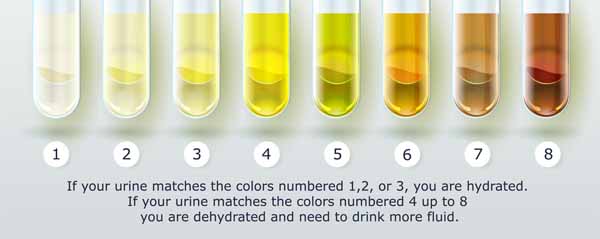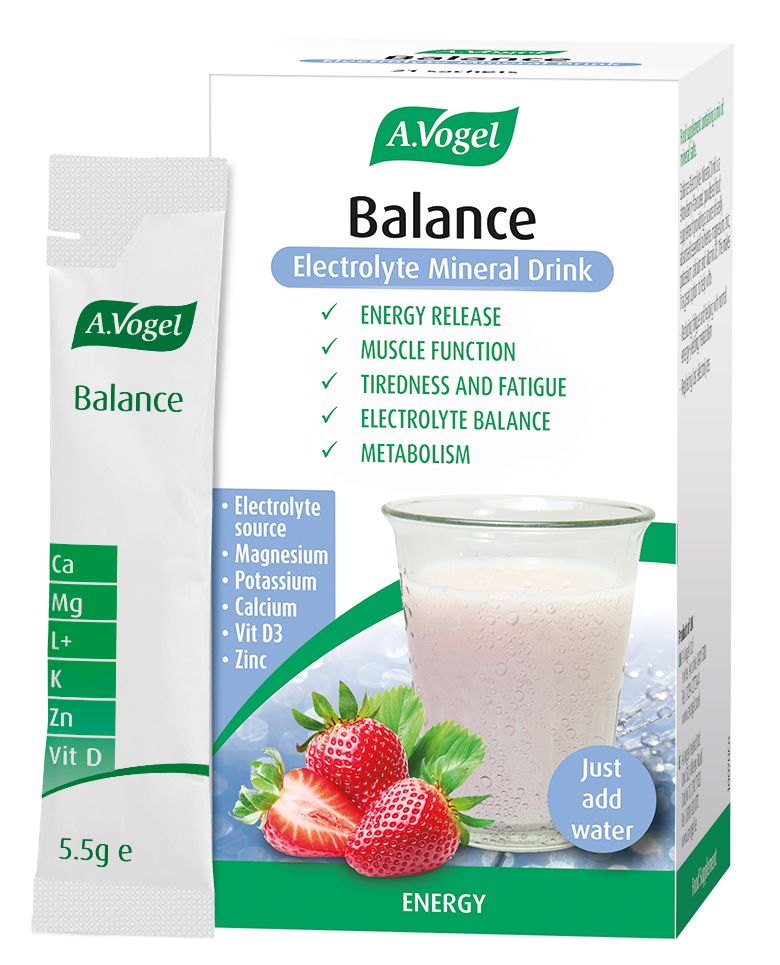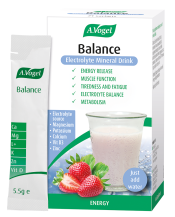What happens when you're dehydrated?
Did you know that the human body is capable of surviving up to three weeks without food but can only last around three days without water? This alone should give you some idea about just how important water is for our overall health and wellbeing, but mild forms of dehydration still remain a common problem and this can affect your body in a number of ways. The tricky thing is that the symptoms of dehydration could easily be mistaken for the signs of another illness or condition instead. That’s why below I’m going to go over a few of the more obvious symptoms of dehydration and how they can affect your body.
11 signs of dehydration
1 – Discoloured urine

One of the simplest ways to work out whether or not you’re dehydrated would be to check the colour of your urine. This makes sense when you think about it; your kidneys rely on a steady influx of fluids in order to expel toxins efficiently. The more water you drink, the paler and less concentrated your urine will appear. If your urine is darker in colour though, this can be a sign that it’s more concentrated, which means you’re not drinking enough fluids.
When it comes to the health of your kidneys and bladder, this can cause real complications. For a start, all those nasty toxins that are usually excreted through your urine will instead be accumulating in your body, impacting your bladder and making you more susceptible to UTI’s, cystitis and other infections. If left untreated, these issues can develop into a kidney infection, a serious complication that should be brought to your doctor’s attention as soon as possible!
2 – Constipation

Are you feeling a bit backed up and bloated? The symptoms of constipation are never pleasant to experience and can be caused by a variety of factors, including dehydration. Just like your kidneys, your digestive system relies on a nice, steady intake of fluids to help keep things ticking over nicely and, if it’s getting an insufficient amount, this can make stools hard, dry and difficult to pass thus leading to those tricky constipation symptoms. That's why our Digestive Advisor Ali always recommends that sufferers increase their fluid intake during a bout of constipation.
3 – Fatigue

Our Sleep Advisor Marianna discusses this symptom in a little more depth in her blog, ‘Are you really tired or is dehydration making your sleepy?’ so I’ll try to keep things brief here. Simply put, dehydration can influence your levels of important amino acids which your body needs to produce melatonin, the sleep hormone. This means that, if you’re not drinking enough water, it can cause sleep problems which may contribute to daytime fatigue. It also doesn’t help matters that your brain, arguably your body’s most important organ, is composed of 73% water so dehydration can also have an impact here too!
4 – Dizziness

Dizziness can be an alarming symptom to experience but often most people might not immediately connect it with their fluid intake. When dehydration occurs though, it can influence your blood pressure (as I will shortly be discussing!) which means that your brain, in addition to not receiving an adequate amount of water, will also struggle to get the oxygen supply that it needs. This can then make you feel more light-headed and dizzy as a result.
5 – Blood pressure

Dehydration, believe it or not, can have a profound effect on your blood pressure. This impact can vary though – generally, experiencing higher blood pressure levels is more common, low blood pressure isn’t unheard of either. High blood pressure tends to occur because, when your body lacks sufficient fluids, your brain will send a signal to your pituitary gland to start producing the chemical vasopressin. This chemical then causes your blood vessels to narrow, increasing your blood pressure.
6 – Poor concentration

Struggling to think clearly? Can’t quite seem to keep focus? This is another sign of dehydration that’s worth mentioning and, similar to fatigue, it occurs as a result of how your brain reacts to an insufficient supply of fluids. If you’re suffering from low energy levels, dizziness and blood pressure fluctuations then this will naturally take a toll on your cognitive functions, but what’s scary is how much it can affect your mental capacities. A 2015 study conducted by Loughbourgh University found that driving dehydrated could be potentially hazardous. Participants in this study who had their fluid intake restricted committed a significantly greater number of errors and had a performance similar to intoxicated drivers!1
7 – Headaches

If you’re suffering from fatigue or poor concentration, then having a headache seems like a natural addition to this collection of symptoms. The underlying cause of this particular sign though, might shock you. Remember, that earlier I mentioned your brain is composed of 73% water? Well, if you’re not getting enough fluids, this can actually cause your brain to contract or shrink, pulling away from your skull thus causing you a degree of pain and discomfort.2 Now don’t worry, this might sound quite alarming but rest assure, if you rehydrate properly your brain should return it its normal size without any further issues!
8 - Mood swings

Mood swings can be caused by any number of health problems – stress, sleep deprivation and PMS are all prime suspects when it comes to feelings of irritability or restlessness but dehydration too, can play a role here. Once again, a poor flow of blood and oxygen to the brain seems to be the main cause but some experts also seem to think that an imbalance in electrolytes such as magnesium and potassium, which often occurs during bout of dehydration, could be to blame too.
9 – Hunger

If you’re feeling thirsty this is a nice and obvious cue that you should be drinking more water, but, if you’re feeling hungry, this might be a more subtle indication that you could do with topping up your fluid levels. Why would dehydration cause you to feel hungry rather than thirsty though? Well, as we’ve discussed, when you experience dehydration your brain won’t be functioning at its full capacity and the hypothalamus (the area of your brain which regulates thirst and appetite) can get confused. This means that, rather than feeling the urge to reach for a bottle of water, you can’t stop thinking about munching on a bag of crisps or tucking into a sandwich instead. Although you can get a little bit of fluids from your food, depending on what you’re eating, this probably won’t be enough to rehydrate you.
10 – Heart palpitations

Heart palpitations are another of these troubling symptoms that often aren’t immediately associated with dehydration. It’s not one of the more common side effects and usually only occurs when dehydration causes your blood pressure to drop. This then means that your heart then has to work that bit harder to pump the blood around your body, which can cause an abnormal heartbeat.
11 – Muscle cramps

When it comes to your muscles and joints, an adequate intake of fluid is pivotal. Your muscles rely on a nice steady flow of blood and nutrients to function properly but, if you’re not drinking enough water, this blood flow can become restricted. It also doesn’t help that essential minerals such as potassium and calcium can become lost during a bout of dehydration and, as a result, your muscles can become sore and more prone to cramping.
What is the fastest way to cure dehydration?
So, as you can see, the repercussions of dehydration can be far reaching and at times the signs can be quite worrying. That’s why, once many people realise dehydration is at the root of their symptoms, they’re quick to try and find ways of solving this problem. The best remedy for dehydration though, is still good, plain old-fashioned water.
Experts can’t seem to agree on an exact figure but 1.5-2 litres a day is still the best estimation we have; however, there are times when you will need to increase this figure. For example, if you’re…
- Exercising
- Experiencing a warmer climate
- Suffering from vomiting or diarrhoea
- Suffering from a UTI
- When you’re ill
- Drinking alcohol
These are times when your body is most vulnerable to losing fluid so it makes sense that this is when you may need to look at increasing your intake. A lot of people, especially if they’re exercising, tend to look for more specialised drinks though, that claim to restore their levels of ‘electrolyte.’ Now I’ve mentioned electrolytes a few times already but, simply put, an electrolyte refers to a mineral that emits a small, electrical charge.
Electrolytes are important because they help to regulate healthy fluid levels, but, if you’re dehydrated, you’re going to be lacking these crucial minerals. That’s why sport drinks are such an attractive option but these are usually packed full of extra sugars and sweeteners.
Our Balance Mineral Drink would be a much safer, healthier option here as this contains a variety of key electrolytes, such as potassium, vitamin D, calcium and magnesium, plus it’s specifically indicated to help fight fatigue – an added bonus!
A.Vogel Balance Electrolyte Mineral Drink with Vitamin D3, Magnesium, Zinc, Potassium and Calcium.
£22.49 (21 x 5.5g sachets) In Stock
How long does it take to rehydrate?
This can be tricky to estimate as, generally, the longer you’ve been dehydrated, the longer it will take to rehydrate. In cases of mild dehydration, this might mean you’ll need to steadily increase your fluid intake over a couple of hours before you feel any better but, in more serious cases, it could take up to a day. If you feel as though you could be severely dehydrated, it’s extremely important that you speak to your doctor, even if it means making an out of hours appointment. Remember, the human body might be able to survive weeks without food but there’s a reason you can only go a few days without water!






 Looking for our products in a store near you?
Looking for our products in a store near you?

